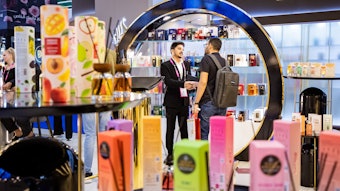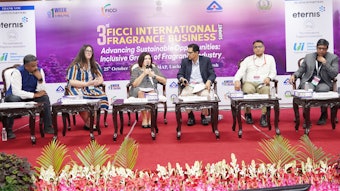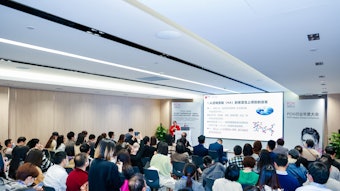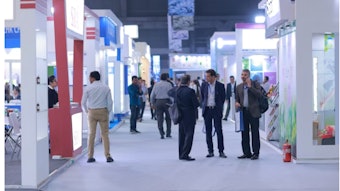The dance floor at this year’s World Perfumery Congress gala dinner literally quaked beneath a flood of dancers. As one speaker noted, an industry that works hard plays hard. Between courses, attendees were treated to an intense fireworks display over the shore, followed by more dancing and networking. The next morning, it was back to business. Jacques Seguela (Havas Advertising) is something of an advertising guru, a man who understands emotional connections between consumers and brands. During his racy, raucous presentation, Seguela announced a future of extremes—niche and mass. Yet, he said, what makes a fragrance a prestige scent is not price, but rather talent. Perfumers should not think of their scents as droplets in a bottle; instead, they must conceive of it in poetic terms the consumer can connect to, such as “a drop of springtime.”
Veronique Gabai-Pinsky (Symrise) encouraged the industry to bring back the magic, whether using organics or synthetics (an old argument she finds irrelevant). “Quality is king,” she said. And, in an effort to pass along a strong fragrance heritage, Gabai-Pinski has participated along with a number of competitors in training young people to smell—though she noted that young people (in defiance of conventional wisdom) do indeed possess their own sort of fragrance heritage. Friedrich Gerberding (Fragrance Resources) warned of the McDonaldization—a plague of product homogenization—in fragrances. The solution may lie in emerging novel materials, in addition to good old-fashioned perfumery values: patience, empathy, harmony and a strong aesthetic sense.
In fragrances, quality is king. In detergents, according to Hans Willi Schroiff (Henkel) fragrance is king. Given the “functional flatness” of most detergent categories—most products clean, soften, etc. to similar degrees—it is scent that distinguishes brands, which creates huge opportunities for perfume houses to make products sing. Jean Mane, a “child of Grasse,” discussed the paradox of naturals and recent regulatory pressures. While the public continues to demand more naturals, government bodies continue to subject these materials to increased testing and labeling. One solution he mentioned was the production of selective extractions that can minimize or eliminate unwanted constituents.
Tomorrow, the event concludes with a closing dinner.










